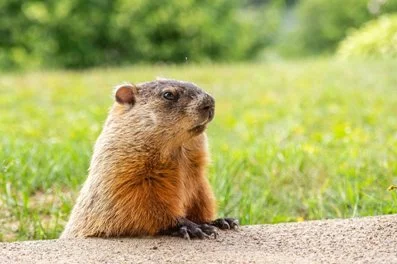- 5 Simple Tricks to Eliminate Maggots From Pet Waste - October 24, 2023
- Keep Your Outdoor Compost Piles Maggot-Free - October 24, 2023
- How to Get Rid of Maggots – Methods that Work - August 30, 2023
Write an introduction paragraph and a two sentence answer for the topic ‘does vinegar get rid of groundhogs?‘ Groundhogs are cute creatures that are known for their burrowing habits. However, their burrows can cause damage to gardens, lawns and even buildings. This is why many people seek ways to get rid of groundhogs.
One popular method that some people suggest to get rid of groundhogs is using vinegar. But does vinegar really work? Unfortunately, vinegar alone is not enough to repel or get rid of groundhogs, but lets take a deeper dive into the question.
How effective is vinegar as a groundhog repellant?
Vinegar is a common household item that many people use for various purposes, including cleaning and cooking. However, some individuals have suggested that vinegar can also be used as a groundhog repellent. While white vinegar and apple cider vinegar are commonly used in homemade repellent mixtures, the question remains: how effective is vinegar as a groundhog repellant?
Vinegar mixture may temporarily repel groundhogs, but it is not a long-term solution. Groundhogs are intelligent animals that quickly learn to adapt to their environment. They may initially be deterred by the smell of vinegar, but they will eventually become accustomed to it and return to their burrows.
Critter Ridder animal repellent is a more effective option than vinegar for repelling groundhogs. This product contains natural ingredients such as black pepper oil, cinnamon oil, and peppermint oil that create an unpleasant scent for groundhogs. Critter Ridder animal repellent can be applied directly to the soil around plants or sprayed on surfaces where groundhogs are likely to travel.
Adding hot pepper to vinegar mixture may increase its effectiveness as a repellent. Hot peppers contain capsaicin, which irritates the eyes and nose of animals like groundhogs. By adding hot pepper flakes or cayenne pepper powder to your vinegar mixture, you may create a stronger deterrent for these pests.
So how does vinegar repel groundhogs? Vinegar has a strong odor that many animals find unpleasant, including groundhogs. When sprayed around burrow entrances or on plants that these pests enjoy eating, the smell of vinegar can discourage them from returning.
If you’re wondering how to get rid of groundhogs using vinegar, there are several steps you can take:
- Mix equal parts water and white or apple cider vinegar in a spray bottle.
- Add hot pepper flakes or cayenne pepper powder if desired.
- Spray the mixture around burrow entrances or on plants that groundhogs have been eating.
- Reapply the mixture every few days to maintain its effectiveness.
However, it’s important to note that vinegar is not a foolproof solution for getting rid of groundhogs. These pests are persistent and may eventually return despite your efforts. If you have a serious groundhog problem, it may be best to consult with a professional pest control service.

What smells do groundhogs hate the most?
Strong Smells that Groundhogs Hate
Groundhogs are known to be stubborn pests, and getting rid of them can be a challenging task. These animals have a keen sense of smell, which they use to locate food and detect danger. As such, using strong smells is one way to repel groundhogs from your property.
Predator Urine
One of the most effective scents that groundhogs hate is predator urine. This scent triggers their flight response, making them flee from the area. You can purchase predator urine products online or at your local garden store. Coyote and fox urine are the most common types used for this purpose.
Ammonia
Another smell that can repel groundhogs is ammonia. The pungent odor irritates their sensitive noses, causing them to avoid the area altogether. To use this method, mix equal parts water and ammonia in a spray bottle and apply it around your garden or yard.
Smoke
Smoke is another scent that groundhogs dislike because it interferes with their ability to smell food and predators. One way to use smoke as a repellent is by lighting a fire near their burrows or tunnels.
Lavender
Lavender has an overpowering aroma that groundhogs find unpleasant. Planting lavender around your garden or yard can help keep these pests away naturally.
Sour Tastes
Groundhogs also dislike sour tastes, so you can try placing slices of citrus fruits like lemons or oranges around your property as a natural deterrent.
Epsom salt
Epsom salt is a type of salt that can help keep pesky groundhogs away from your garden. Groundhogs don’t like the bitter taste of Epsom salt, so they will avoid eating anything that has been treated with it. You can sprinkle it around your garden or mix it with water to create a spray solution. Make sure to reapply the Epsom salt after rain or watering, as it may wash away. Epsom salt is safe for plants and won’t harm them, so you can use it without worrying about damaging your garden.
Castor oil
Castor oil is another way to keep groundhogs away from your garden without harming it. It’s a safe and effective method to repel these animals from your property.
Mothballs
Another common groundhog deterrent is mothballs. These small balls contain a strong-smelling chemical that repels groundhogs and other pests. However, it’s important to note that mothballs can be harmful to pets and children if ingested, so use caution when placing them around your garden or yard.
The Best Methods for Naturally Getting Rid of Groundhogs Permanently
Groundhogs, also known as woodchucks, are burrowing animals that can cause significant damage to your property. They create holes and burrows in the ground, which can be hazardous to people and pets. If you’re dealing with a groundhog problem, it’s important to address it as soon as possible. In this section, we’ll discuss some of the best methods for naturally getting rid of groundhogs.
Groundhog Traps: One of the most effective ways to get rid of groundhogs is by using a trap. There are different types of traps available on the market, but live traps are the most humane option. These traps allow you to catch the groundhog without harming it and then release it into a different location away from your property. When setting up a trap, make sure to place it near the entrance of the burrow or in an area where you’ve seen groundhog activity.
Chicken Wire: Another way to deter groundhogs from entering your property is by using chicken wire. This wire can be used to block off groundhog holes and burrows, preventing them from accessing their underground homes. Make sure to bury the wire at least one foot deep so that the groundhogs cannot dig under it. Fences can also be a good way to keep groundhogs away from your garden.
Cat Litter: Groundhogs have a strong sense of smell, and certain scents can deter them from returning to their burrows. One such scent is cat litter. Sprinkling used cat litter around their burrow entrances can make them think there’s a predator nearby and discourage them from coming back.
Prevention: Prevention is key when dealing with groundhogs. Keeping your lawn well-maintained and free of debris can help prevent them from making themselves at home on your property. Removing any sources of food or water will make your property less attractive to these rodents.
If all else fails, you may need to consider hiring a professional pest control company to handle the problem. These companies have experience dealing with various types of pests and can provide effective solutions tailored to your specific situation.
